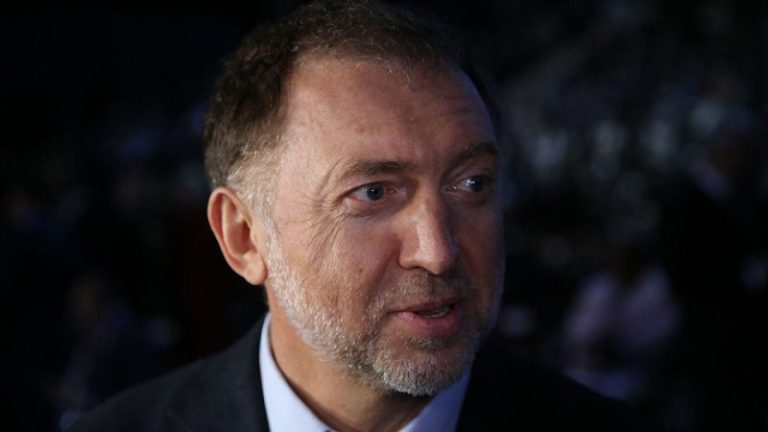A former senior FBI counterintelligence official who spearheaded the Trump-Russia probe was arrested and charged over his own alleged ties to a sanctioned Russian oligarch amid the war in Ukraine.
Charles McGonigal, the former special agent in charge of the FBI’s Counterintelligence Division in New York who retired in 2018, is charged with violating U.S. sanctions by agreeing to provide services to Oleg Deripaska, a sanctioned Russian oligarch. He was charged alongside Sergey Shestakov, a former Soviet and Russian diplomat who later became a U.S. citizen and a Russian interpreter for courts and government offices, through a five-count indictment unsealed in Manhattan federal court Monday.
McGonigal and Shestakov both were arrested Saturday. The indictment is a rare move by federal prosecutors to bring charges against a former senior FBI official before a federal grand jury.
Though not referenced in or related to the indictment, McGonigal, while serving as chief of the cybercrimes section at FBI headquarters in Washington, D.C., was one of the first bureau officials to learn of allegations that George Papadopoulos, a campaign adviser for former President Donald Trump, boasted that he knew Russians had dirt on Hillary Clinton, launching the investigation into alleged Russian election interference known as Operation Crossfire Hurricane, Business Insider previously reported.
McGonigal, 54, of New York City, and Shestakov, 69, of Morris, Connecticut, ‘both previously worked with Deripaska to attempt to have his sanctions removed, and, as public servants, they should have known better,’ U.S. Attorney for the Southern District of New York Damian Williams said in a statement. ‘This Office will continue to prosecute those who violate U.S. sanctions enacted in response to Russian belligerence in Ukraine in order to line their own pockets.’
Both men are charged with one count of conspiring to violate and evade U.S. sanctions, in violation of the International Emergency Economic Powers Act (‘IEEPA’), one count of violating the IEEPA, one count of conspiring to commit money laundering, and one count of money laundering, each of which carries a maximum sentence of 20 years in prison. Shestakov is also charged with one count of making false statements, which carries a maximum sentence of five years in prison, prosecutors said.
‘The FBI is committed to the enforcement of economic sanctions designed to protect the United States and our allies, especially against hostile activities of a foreign government and its actors,’ FBI Assistant Director in Charge Michael J. Driscoll said. ‘Russian oligarchs like Oleg Deripaska perform global malign influence on behalf of the Kremlin and are associated with acts of bribery, extortion, and violence.’
‘After sanctions are imposed, they must be enforced equally against all U.S. citizens in order to be successful,’ Driscoll added. ‘There are no exceptions for anyone, including a former FBI official like Mr. McGonigal. Supporting a designated threat to the United States and our allies is a crime the FBI will continue to pursue aggressively.’
It was then-President Barack Obama who in 2014 issued Executive Order 13660, which declared a national emergency with respect to the situation in Ukraine following the annexation of Crimea.
On April 6, 2018, the U.S. Department of the Treasury’s Office of Foreign Assets Control (‘OFAC’) designated Deripaska as a Specially Designated National (‘SDN’), sanctioning him for acting on behalf of a senior official of the Russian Federation’s government and for operating in the Russian energy sector.
In 2021, the two defendants agreed to and did investigate a rival Russian oligarch of Deripaska in return for concealed payments from Deripaska, in violation of sanctions the United States imposed in 2018, the indictment says. McGonigal and Shestakov allegedly knew their actions violated U.S. sanctions because, among other reasons, while serving as special agent in charge, McGonigal received then-classified information that Deripaska would be added to a list of oligarchs considered for sanctions.
As part of their negotiations with Deripaska’s agent, McGonigal, Shestakov and the agent attempted to conceal Deripaska’s involvement by, among other means, not directly naming Deripaska in electronic communications, using shell companies as counterparties in the contract that outlined the services to be performed, using a forged signature on that contract, and using the same shell companies to send and receive payments from Deripaska, according to the indictment.
In 2019, McGonigal and Shestakov also allegedly worked on behalf of Deripaska in an unsuccessful effort to have the sanctions against Deripaska lifted. In November 2021, when FBI agents questioned Shestakov about the nature of his and McGonigal’s relationship with Deripaska’s agent, the interpreter made false statements in a recorded interview, federal prosecutors said.
FBI Director Christopher Wray told Fox News Digital in a statement: ‘The way we maintain the trust and confidence of the American people is through our work—showing, when all the facts come out, that we stuck to the process and we treated everyone equally, even when it is one of our own. The FBI will go to great lengths to investigate and hold accountable anyone who violates the law, including when the individual is an FBI employee. We hold ourselves to the highest standard, and our focus will remain on our mission and on doing the right thing, in the right way, every time.’

